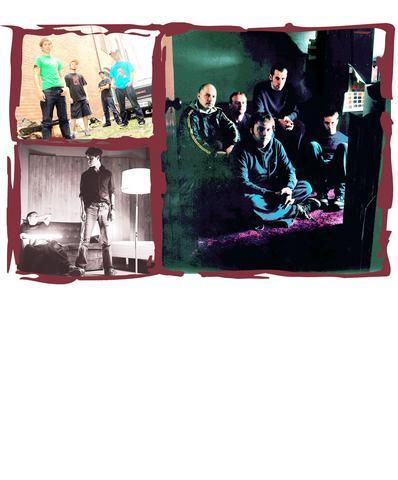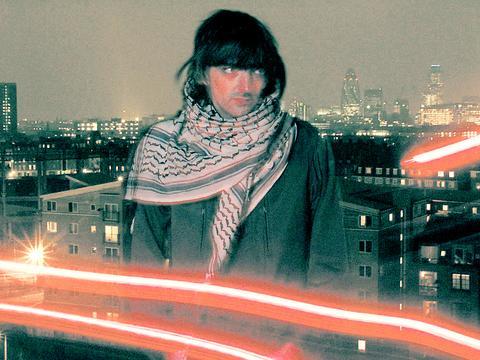It used to be there was a season for festivals -- summer -- and they came fast and furious, with Spring Scream, then Ho-Hai-Yan and finally Formoz, after which the organizers would go home and hopefully count their money and fans would return to indoor venues to get their music fix. No more.
To hear Doris Yeh (葉湘怡) of the Taiwan Rock Alliance (TRA) tell it, she took a look at the calendar and noticed that, hey, nothing ever happens in the fall. "So we thought, why not put on a show then."

PHOTO COURTESY OF ARTISTS
"We" refers to Yeh and her partner Freddy Lin (

PHOTO COURTESY OF FANATIC PROMOTION
The choice of venues is refreshing for its discovery of Taiwan's other dominant natural resource for this type of event, namely the mountains. And unlike the summer's festivals with their enormous stages, corporate sponsors and all the other fittings of bloated music concerts, Autumn Tiger will be relatively low-key -- sort of like an after-party for Taiwan's indie music scene.
That's not to say the lineup was an afterthought, though. A distilled batch of Taiwan's most popular indie bands is set to play. Scottish post-rock gods Mogwai will make an appearance, along with England's Capitol K, Tribeca from Sweden and the G.B.H.-meets-Jesus Lizard punk band FC Five from Japan.
For those who may scratch their heads at the reappearance of Mogwai in Taipei less than a year after playing The Wall last November and who have noted a rash of second and third comings by foreign bands, ie. Dirty Three, FC Five and Cat Power, there's an explanation in that all these groups initiated the contact. "It's not because we don't know any other bands," Yeh said.
No one will complain anyway about another chance to catch Mogwai live tomorrow night, and this time in the unusual setting of Wulai Elementary School's playground. Their music is more commonly associated with dark, smoky clubs, but its epic scale and intense volume should play interestingly in the lush river valley.
The newcomers to Taiwan -- Tribeca and Capitol K -- show some interesting variety for their synth pop and rock-electronica fusion. Most importantly, they sound like nothing being made in Taiwan.
Tribeca is an updated version of the Pet Shop Boys or pre-Violator Depeche Mode, with the residual influences of 1990s indie rock. It's either fabulously ironic or cringe-inducing, depending on one's judgment of 1980s post-disco synth music. Either way it's undeniably melodic and the lyrics of teen angst and furtive sexual experiences raise suspicions that front-man Lasse Lindh is telling stories from his adolescent years.
Taking things into uncharted musical territory is Capitol K, whose two albums contain every imaginable type of music re-engineered in the most improbable ways. It's the kind of experimentation that goes awry in less able hands or that comes out establishing new genres. Capitol K is in the latter category.
Filling up the rest of the lineup over the two days on two stages will be local favorites like Tizzy Bac, WonFu (旺福), Nipples and LTK. Taipei's best shoe-gazer band Sugarplum Fairy (甜梅號) will even make a reunion appearance. Keeping things going on Saturday night will be DJ@llen, DJ K and Lim Giong (林強) in case people don't feel like leaving after the bands finish. And who would? Camping will be allowed at the venue.
Kristian Craig Robinson, who plays music under the name Capitol K, has released three albums that earned him a spot at the forefront of England's independent music scene. Taipei Times caught up with Robinson at home to figure out where the ideas behind the music come from.
Taipei Times: You were born in Malta, and grew up in Brunei. Isn't that an unusual upbringing?
Kristian Craig Robinson: Yeah. Malta's this tiny island out in the middle of the Mediterranean where people go for holidays. I don't remember much from those days because I left when I was two. But I have a lot of family there still, so I go back quite often. It's really small, though. I mean like nine miles (14km) by five (8km), so it's a bit claustrophobic.
After living in Malta we moved to Brunei in like the late 1970s, early 1980s, and left when they got their independence ... I remember all the crazy parades and gold-plated Rolls Royces. It was kind of like Disneyland with phenomenal wealth.
TT: Did life in those places stick with you in later years?
Robinson: In a musical sense it influenced me for sure. It's more soundscapey, with some Eastern melodies and sampling. I went back to Asia and did a lot of location recording for the second album (Happy Happy). The recent stuff is more a result of being in London for seven years.
But maybe because I grew up in a culture that is Islamic, Malay and Chinese, I have a more global point of view than my neighbors here [in London].
TT: How do the dynamics differ when you work solo and in a band?
Robinson: I started out doing studio projects, and pretty much play live on my own most of the time. I did that for several years, sort of doing all the stuff, and wanted to get back into the live thing with a full band lately with the second album. But in Taipei I'll be playing solo and that's how I've been playing for some time now.
TT: Do you find working in band constricts your space for experimentation or does a band bring out more experimentation in you?
Robinson: I'd say it's equal in both parts. Playing in band you realize you need a lot of backing. We have a live drum kit, electronic drums, three laptops and all that. It's a lot to get sounding right, but when it happens right, when we merge electronics and live sound it's wonderful. Playing alone live it's much more electronic.
TT: What will you bring to Taipei?
Robinson: I'll be coming with a mixer, two laptops, a theramin, a couple of dictaphones, a guitar, effects pedals. I've got stuff on my computer all sequenced and ready. I've got tapes here from Brunei, Malaysia, festivals, one from Cologne, Morocco.
TT: What will you play in Taipei?
Robinson: I'll play stuff from both albums and I've been finishing an album here and might bring some of that with me.
TT: Should people stare at their feet or move their feet for your show?
Robinson: I don't really mind. The worst thing that can happen is when people talk. That's really disconcerting.
Capitol K will play tomorrow night at 10:20pm.

April 14 to April 20 In March 1947, Sising Katadrepan urged the government to drop the “high mountain people” (高山族) designation for Indigenous Taiwanese and refer to them as “Taiwan people” (台灣族). He considered the term derogatory, arguing that it made them sound like animals. The Taiwan Provincial Government agreed to stop using the term, stating that Indigenous Taiwanese suffered all sorts of discrimination and oppression under the Japanese and were forced to live in the mountains as outsiders to society. Now, under the new regime, they would be seen as equals, thus they should be henceforth

With over 100 works on display, this is Louise Bourgeois’ first solo show in Taiwan. Visitors are invited to traverse her world of love and hate, vengeance and acceptance, trauma and reconciliation. Dominating the entrance, the nine-foot-tall Crouching Spider (2003) greets visitors. The creature looms behind the glass facade, symbolic protector and gatekeeper to the intimate journey ahead. Bourgeois, best known for her giant spider sculptures, is one of the most influential artist of the twentieth century. Blending vulnerability and defiance through themes of sexuality, trauma and identity, her work reshaped the landscape of contemporary art with fearless honesty. “People are influenced by

Last week, the the National Immigration Agency (NIA) told the legislature that more than 10,000 naturalized Taiwanese citizens from the People’s Republic of China (PRC) risked having their citizenship revoked if they failed to provide proof that they had renounced their Chinese household registration within the next three months. Renunciation is required under the Act Governing Relations Between the People of the Taiwan Area and the Mainland Area (臺灣地區與大陸地區人民關係條例), as amended in 2004, though it was only a legal requirement after 2000. Prior to that, it had been only an administrative requirement since the Nationality Act (國籍法) was established in

The remains of this Japanese-era trail designed to protect the camphor industry make for a scenic day-hike, a fascinating overnight hike or a challenging multi-day adventure Maolin District (茂林) in Kaohsiung is well known for beautiful roadside scenery, waterfalls, the annual butterfly migration and indigenous culture. A lesser known but worthwhile destination here lies along the very top of the valley: the Liugui Security Path (六龜警備道). This relic of the Japanese era once isolated the Maolin valley from the outside world but now serves to draw tourists in. The path originally ran for about 50km, but not all of this trail is still easily walkable. The nicest section for a simple day hike is the heavily trafficked southern section above Maolin and Wanshan (萬山) villages. Remains of